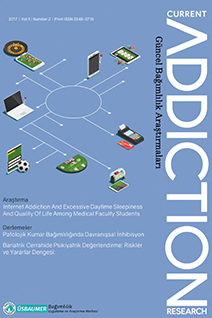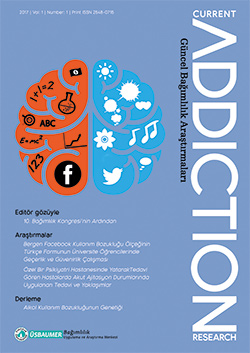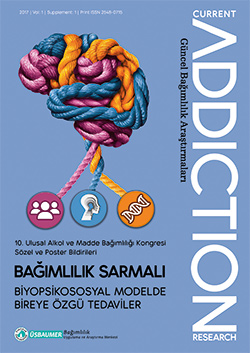Years
2018
Categories
Authors
ARTICLES
Original Article
Ayşegül Tosuner,Zehra Arıkan
2018, 2(2), s:39-46
Objective: To identify the prevalence of violence in alcohol and drug abusers and a control group; to determine the relationship between violent behavior and impulsivity, anger, aggression, traumatic childhood experiences and indicate whether prevalence of violence differs between periods of deprivation, soberness and while under the influence of alcohol/drugs.
Method: 49 alcohol abusers and 31 drug abusers aged 15-65 years were compared among themselves and also with 62 healthy controls; using a questionnaire including questions related with sociodemographic characteristics of violence, the Buss-Perry Aggression Scale, Barratt Impulsivity Scale, the State-Trait Anger Scale, the Childhood Trauma Questionnaire, Hamilton Depression Scale, the State-Trait Anxiety Inventory.
Results: The prevalence of psychological violence was 85%, physical violence 54%, sexual violence 6% and economic violence 10%. Significant differences were found in most of the variables among the groups, which were thought to be related to violent behavior.
Conclusion: In addition to medical treatment for addiction, psychotherapeutic interventions focusing on personality traits in areas such as anger control and impulsivity should be adopted. The fact that violence decreases in sober periods indicates that violence is rather a result of the nature of the substance.
Original Article
Predictors for Fear of Missing Out in the Social Networks Among University Students
Çağrı Yalçın Çınar,Elif Mutlu
2018, 2(2), s:47-53
Objective: Social networks have become indispensable of our lives with the spread of the internet. The increase of time spent on social networks led to appear a new consept of fear of missing out. The purpose of this research was to determine predictors for Fear of Missing Out (FoMO) among university students.
Method: The sample of the research was 400 Kırklareli university students who were determined by random sampling method. The data was collected using personal information form, Life Satisfaction Scale, BAPI Internet Form, FoMO Scale, Rosenberg Self-Esteem Scale, Five Factor Personality Scale and Adult ADHD Self-Report Scale. SPSS Statistical Software package was used in the analysis of the data.
Results: As a result of research, Fear of Missing Out was found to be higher among students who also find lessons boring and check social media hourly especially in during the course who have low self-esteemand in the first grade. Inaddition, it was determined that internet addiction,neurotic features, attention deficit and hyperactivity have positively associated with FoMO.
Conclusion:Internet addiction, impulsivity and neurotic features are determined as influential factors in the emergence of FoMO.
Review Article
Ali Yasin Kafes,Selami Ülker,Gökben Hızlı Sayar
2018, 2(2), s:54-58
Food addiction has become a subject of increasing interest recently, particularly in societies where the prevalence of obesity is increasing. In individuals consuming excessive carbohydrates, it is suggested that the behavior of consuming these foods is transformed into a kind of addiction, and it is reported that the attitudes observed in these individuals can be common with the basic symptoms that are constantly observed in substance addiction. The suggested dysfunction of reward system which proposed to be related with food addiction tried to be supported by clinical and experimental studies. In this review, food addiction will be defined, and clinical overlaps, probable etiologic factors and treatment options will be discussed.
Review Article
Gül Eryılmaz,Işıl Göğcegöz
2018, 2(2), s:59-61
Pathological gambling is a mental disorder characterized that might cause significant decrements in social, vocational and family life. In this report, addictive gambling behavior, which may be called secondary or iatrogenic, has been reviewed.
Case Report
Gambling Disorder Following Bariatric Surgery
Gül Eryılmaz,Cemal Onur Noyan
2018, 2(2), s:62-63
Pathological gambling is defined as persistent and repetitive gambling behaviors, characterized by the inability to control the gambling behavior of the individual, family or professional functionality. It is stated that the possibility of occurrence of alcohol and substance use disorders is increased after obesity operations, which have been frequently applied in recent years. Until now, gambling disorder, which is considered as impulse control disorder, is evaluated under the category of addiction behaviors with DSM-5. In this case report, the case of gambling disorder following bariatric surgery will be discussed.



 2. Sayı
2. Sayı
 1. Sayı
1. Sayı
 Ek Sayı
Ek Sayı







